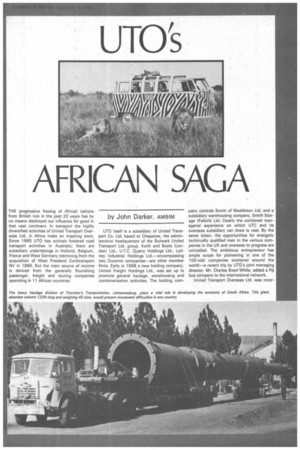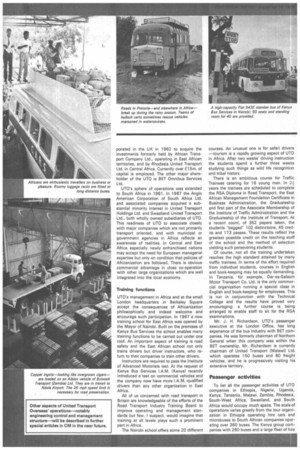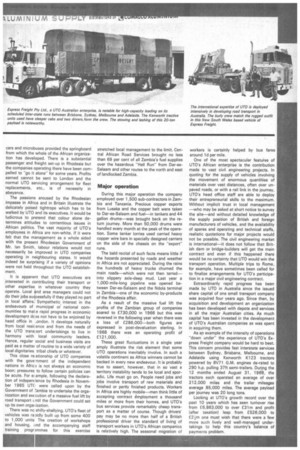AFRICAN SAGA
Page 59

Page 60

Page 61

If you've noticed an error in this article please click here to report it so we can fix it.
by John Darker, AMBIM THE progressive freeing of African nations from British rule in the past 20 years has by no means destroyed our influence for good in that vast continent. In transport the highly diversified activities of United Transport Overseas Ltd, in Africa make an inspiring story. Since 1965 UTO has actively fostered road transport activities in Australia; there are subsidiary undertakings in Holland, Belgium, France and West Germany stemming from the acquisition of West Friesland Eurtitransport NV in 1966. But the main source of income is derived from the generally flourishing passenger, freight and touring companies operating in 11 African countries. UTO itself is a subsidiary of United Transport Co. Ltd. based at Chepstow, the administrative headquarters of the Bulwark United Transport Ltd. group, Keith and Boyle {London) Ltd., U.T.C. Quarry Holdings Ltd., Lydney Industrial Holdings Ltd.—encompassing two Duramin companies—are other member firms. Early in 1968 a new holding company, United Freight Holdings Ltd., was set up to promote general haulage, warehousing and containerization activities. The holding corn pany controls Smith of Maddiston Ltd. and a subsidiary warehousing company, Smith Storage (Falkirk) Ltd. Clearly the combined managerial experience on which UTC and its overseas subsidiary can draw is vast. By the same token, the opportunities for energetic technically qualified men in the various companies in the UK and overseas to progress are unrivalled. The ambitious entrepreneur has ample scope for pioneering in one of the 100-odd companies scattered around the world—a recent trip by UTO's joint managing director. Mr. Charles Boyd White, added a Fiji bus company to the international network.
United Transport Overseas Ltd. was incor porated in the UK in 1962 to acquire the investments formerly held by African Transport Company Ltd., operating in East African territories, and by Rhodesia United Transport Ltd. in Central Africa. Currently over £1 5m. of capital is employed. The other major shareholder of the UTO is BET Omnibus Services Ltd.
UTO's sphere of operations was extended to South Africa in 1961. In 1967 the Anglo American Corporation of South Africa Ltd. and associated companies acquired a substantial minority interest in United Transport Holdings Ltd. and Swaziland United Transport Ltd., both wholly owned subsidiaries of UTO. This readiness of UTO to associate closely with major companies which are not primarily transport oriented, and with municipal or government agencies in Africa reflects an awareness of realities. In Central and East Africa especially newly enfranchised nations may accept the need for European managerial expertise but only on condition that policies of Africanization are folloilved. There is obvious commercial advantage in close co-operation with other large organizations which are well integrated into the local economy.
Training functions UTO's management in Africa and at the small London headquarters in Berkeley Square accept the consequences of Africanization philosophically and indeed welcome and encourage such participation. In 1967 a new training school for East Africa was opened by the Mayor of Nairobi. Built on the premises of Kenya Bus Services the school enables many training functions to be carried out under one roof. An important aspect of training is road safety and the East African school not only trains drivers but driver instructors, who return to their companies to train other drivers.
Instructors are required to pass the Institute of Advanced Motorists test. At the request of Kenya Bus Services I.A.M. (Kenya) recently introduced a test on commercial vehicles and the company now have more I.A.M.-qualified drivers than any other organization in East Africa, All of us concerned with road transport in Britain are knowledgeable of the efforts of the Road Transport Industry Training Board to improve operating and management standards but few, I suspect, would imagine that training at all levels plays such a prominent part in Africa.
The Nairobi school offers some 20 different courses. An unusual one is for safari drivers —tourism is a rapidly growing aspect of UTO in Africa. After two weeks' driving instruction the students spend a further three weeks studying such things as wild life recognition and tribal history.
There is an ambitious course for Traffic Trainees catering for 16 young men. In 21 years the trainees are scheduled to complete the RSA Diploma in Road Transport, the East African Management Foundation Certificate in Business Administration, the Graduateship and first part of the Associate Membership of the Institute of Traffic Administration and the Graduateship of the Institute of Transport. At a recent count, of 352 papers taken, the students "bagged" 102 distinctions, 45 credits and 173 passes. These results reflect the greatest possible credit on the teaching staff of the school and the method of selection yielding such persevering students.
Of course, not all the training undertaken reaches the high standard attained by many traffic trainees. In terms of the effort required from individual students, courses in English and book-keeping may be equally demanding. In Tanzania, for example, Dar-es-Salaam Motor Transport Co. Ltd. is the only commercial organization running a special class in English and book-keeping for employees. This is run in conjunction with the Technical College and the results have proved very encouraging: a further course is being arranged to enable staff to sit for the RSA examinations.
Mr. J. H. Richardson, UTO's passenger executive at the London Office, has long experience of the bus industry with BET companies. He was formerly chairman of Northern General when this company was within the BET ownership. Mr. Richardson is currently chairman of United Transport (Malawi) Ltd. which operates 150 buses and 80 freight vehicles, and he is progressively visiting his extensive territory.
Passenger activities
To list all the passenger activities of UTO companies in Ethiopia, Nigeria, Uganda, Kenya, Tanzania, Malawi, Zambia, Rhodesia, South-West Africa, Swaziland, and South Africa would occupy much space. The scale of operations varies greatly from the tour organization in Ethiopia operating hire cars and microbuses to South African companies operating over 360 buses. The Kenya group companies with 260 buses and a large fleet of hire cars and rnicrobuses provided the springboard from which the whole of the African organization has developed. There is a substantial passenger and freight set-up in Rhodesia but the companies operating there have been compelled to "go it alone" for some years. Profits earned cannot be sent to London and the normal UTO servicing arrangement for fleet replacements, etc., is of necessity in abeyance.
The passions aroused by the Rhodesian impasse in Africa and in Britain illustrate the delicately poised tightrope which has to be walked by UTO and its executives. It would be ludicrous to pretend that colour alone determines attitudes to contentious issues in African politics. The vast majority of UTO's employees in Africa are non-white. If it were felt that the management as a whole sided with the present Rhodesian Government of Mr. Ian Smith, labour relations would not necessarily be improved in UTO companies operating in neighbouring states. It would indeed be surprising if a variety of opinions were not held throughout the UTO establishment.
It is apparent that UTO executives are interested in contributing their transport or other expertise in whatever country they operate. Local and area managers could not do their jobs successfully if they played no part in local affairs. Sympathetic, interest in the endeavours of municipal or national communities to mal e rapid progress in economic development dc as not have to be enjoined by head office in _ondon. It develops naturally from local resit once and from the needs of the UTO trans )ort undertakings to live in harmony with local community leaders. Hence, regular social and business visits are paid as a menet of routine to a wide variety of local dignitaries tribal chiefs or whatever.
This close re ationship of UTO companies with the gove -nment of the independent nations in Afric is not always an economic boon; pressures to follow certain policies can be acute. For e: ample, following the declaration of independence by Rhodesia in November 1965 UT( were called upon by the Government of '.ambia to undertake the organization and exE cution of a massive fuel lift by road transport i ntil the Government could set up its own orgai,ization.
There was nc shilly-shallying. UTO's fleet of vehicles was ra )idly built up from some 400 to 1,000 units The creation of workshops and housing, i,nd the accompanying staff training progr mimes for this exercise stretched local management to the limit. Central African Road Services brought no less than 69 per cent of all Zambia's fuel supplies over the hazardous "Hell Run" from Dar-esSalaam and other routes to the north and east of landlocked Zambia.
Major operation
During this major operation the company employed over 1,500 sub-contractors in Zambia and Tanzania. Precious copper exports from Lusaka and the copper belt were taken to Dar-es-Salaam and fuel—in tankers and 44 gallon drums—was brought back on the return journey. More than 50,000 drums were handled every month at the peak of the operation. Some tanker lorries used carried heavy copper wire bars in specially designed carriers on the side of the chassis on the "export" runs.
The bald recital of such facts means little if the hazards presented by roads and weather in Africa are not appreciated. During the rains the hundreds of heavy trucks churned the main roads—which were not then tarred— into slippery axle-deep mud. Last year a 1,000-mile-long pipeline was opened between Dar-es-Salaam and the Ndola terminal in Zambia—one of the economic by-products of the Rhodesia affair.
As a result of the massive fuel lift the profits of the Zambian group of companies soared to £730,000 in 1966 but this was reversed in the following year when there was a loss of £286,000—both figures are expressed in post-devaluation sterling. In 1968 there was an operating profit of £121,000.
These great fluctuations in a single year amply illustrate the risk element that some UTO operations inevitably involve. In such a volatile continent as Africa winners cannot be backed in every new endeavour. It is probably true to assert, however, that in so vast a territory instability tends to be local and sporadic. Life must go on. People need jobs and jobs involve transport of raw materials and finished or partly finished products. Workers in Africa are highly mobile men think little of accepting contract dmployment a thousand miles or more from their homes, and UTO's bus services provide remarkably cheap transport as a matter of course. Though drivers' pay may be no more than half of a British professional driver the standard of living of transport workers in UTO's African companics is relatively high. The seasonal migration of workers is certainly helped by bus fares around 1d per mile.
One of the most spectacular features of UTO's African enterprise is the contribution made to vast civil engineering projects. In quoting for the supply of vehicles involving the movement of enormous quantities of materials over vast distances, often over unpaved roads, or with a rail link in the journey, UTO's head office staff are able to deploy their entrepreneurial skills to the maximum. Without implicit trust in local management —who may be asked at short notice to survey the site—and without detailed knowledge of the supply position of British and foreign manufacturers of vehicles, and the availability of spares and operating and technical staffs, realistic quotations for major projects would not be possible. The civil engineering market is international—it does not follow that British dam or bridge-builders will get the main contract and even if this happened there would be no certainty that UTO would win the transport operation. Multiple trips to Rome, for example, have sometimes been called for to finalize arrangements for UTO's participation in a major civil engineering contract.
Extraordinarily rapid progress has been made by UTO in Australia since the issued share capital of one small transport company was acquired four years ago. Since then, by acquisition and development an organization has been developed with depots and services in all the major Australian cities. As much capital has been invested in the development of UTO's Australian companies as was spent in acquiring them.
As an example of the intensity of operations "down under" the experience of UTO's Express Freight company would be hard to beat. This concern provides fast interstate services between Sydney, Brisbane, Melbourne, and Adelaide using Kenworth K123 tractors powered by 8V71 G.M. engines de-rated to 290 h.p. pulling 37ft semi-trailers. During the 12 months ended August 31, 1968, the tractors each operated an average of over 212,000 miles and the trailer mileages average 85,000 miles. The average payload per journey was 20 long tons.
Looking at UTO's growth record over the past 10 years which has seen turnover rise from £6,863,000 to over £31m and profit (after taxation) leap from £526,000 to £21m one must wish that there were a few more such lively and well-managed undertakings to help this country's balance of payments problem.












































































































































